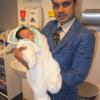According to a report from a King’s College and UCL team published in BJOG would-be mothers should seek help early for any symptoms of eating disorders as there would appear to be a correlation with decreased fertility. This is perhaps not too surprising as missed periods is a common symptom of eating disorders.
The research suggests that women with a history of eating disorders may struggle to fall pregnant quickly and are also more than twice as likely to need fertility treatment. The study of more than 11,000 UK mothers has found that pregnancy rates after six months were lower in women with anorexia or bulimia, but by a year they were the same as the general population. 39.5% of women with a history of bulimia or anorexia took longer than six months to conceive and this compares with a quarter of women in the general population. They were also more likely to need fertility treatment (6.2% of women with eating disorders, compared with 2.7% of the general population).
Lead researcher Dr Abigail Easter of the Institute of Psychiatry at King's College, said: "This research highlights that there are risks to fertility associated with eating disorders. However, the high rates of unplanned pregnancies in women with a history of anorexia suggest that women may be underestimating their chances of conceiving." She added: "Women planning a pregnancy should ideally seek treatment for their eating disorder symptoms prior to conception, and health professionals should be aware of eating disorders when assessing fertility and providing treatment for this."
The data
- 11,088 women questioned in the early months of pregnancy
- Most (96%) said they had never had an eating disorder
- 171 (1.5%) reported having had anorexia at some point in their life
- 199 (1.8%) had had bulimia, while 82 (0.7%) had had both illnesses
- There were more unplanned pregnancies in the women with anorexia - 41.5% compared with 28.6% in the general population
- Women who had had eating disorders were also more likely to report negative feelings about pregnancy
How can you treat denial? “No, I do not have an eating disorder”Ninety six percent of over eleven thousand women say that they do not have an eating disorder. I anticipate that they would also say that they do not have an addiction problem with alcohol or drugs. The basic psychopathology of any compulsive behaviour is denial. This is what makes it so difficult to treat. After all, why should someone seek treatment for a condition that he or she does not have?Something of the order of ten to fifteen percent of the population suffer from addictive or compulsive behaviour but they do not generally ask for help until they experience painful consequences.South Kensington



